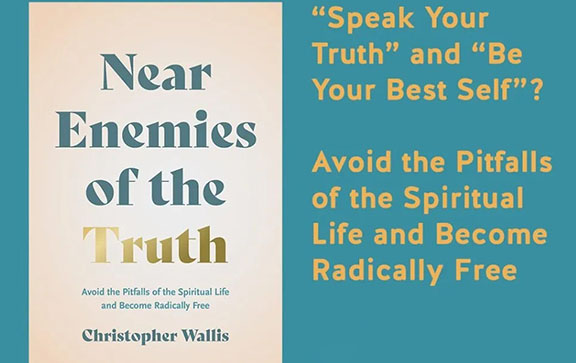
Photo: Ricardo Aguilera via Unsplash
Have you ever been told, “You create your own reality?” Have you been encouraged to “follow your bliss?” Nowadays these slogans are everywhere, but what if they’re doing more harm than good? In his latest book, Near Enemies of the Truth: Avoid the Pitfalls of the Spiritual Life and Become Radically Free, Christopher Hareesh Wallis explores the most widespread distortions of spiritual teachings present in our world today, offering us a guide to the pitfalls of the spiritual life.
Over the years, I’ve spent time in various spiritual communities, from traditional Hindu and Buddhist communities to so-called New Age communities. In this time, I became increasingly concerned with the role platitudes played in these communities and how they often took the place of the challenging but rewarding work of deep inner contemplation. In the most egregious examples (which were commonplace in my experience), people used these platitudes (disguised as wisdom, of course) to avoid facing difficult issues or doing emotional work, despite the great benefits of that work.
For example, if “Everything happens for the best” and “You create your own reality,” then I can’t be held accountable for whatever you think I did to you. This is called spiritual bypassing, and it can be quite harmful to one’s relationships and inhibit the process of real spiritual awakening.
I also became concerned about the increasing prevalence of what philosophers call relativism—the stance that everyone’s point of view is equally valid. Though on the surface this sounds like a pleasingly tolerant idea, unfortunately the only way everyone’s point of view can be equally valid is when there is no such thing as truth. Thus, relativism always masks an implicit nihilism (the view that there are no fundamental truths), and nihilism tends to make human beings cynical and deeply dissatisfied, even when implicit.
These concerns were exacerbated by the changes in US society over the last seven or eight years, a time in which the endemic American distrust of experts and expertise peaked, leading many to suspect that there were no such things as facts in any realm apart from hard science (or even in that realm!), let alone truth. Needless to say, when the idea of truth itself is open to question, the near enemies of the truth flourish like weeds in an untended garden.
My view is that there are fundamental truths that can be verified through careful contemplation of your own experience. Indeed, if there weren’t fundamental truths pertaining to the human experience of reality, truths that impinge upon us whether we’re aware of them or not, we would never be able to effectively communicate or authentically connect with one another.
The modern spiritual marketplace and self-help industry, unfortunately, is rife with near enemies of the truth, because people are inclined toward material that validates and elaborates on what they already believe. The system we have includes no economic incentives for the discovery of truth, especially when the process of discovery is difficult or uncomfortable, even if it eventually results in great joy.
Of all the aspects of human life, spirituality holds the greatest potential for fulfillment, and yet it can also be deeply problematic. It offers the possibility of more profound paradigm shifts than any other domain of human life and the possibility of becoming profoundly confused and deluded. If the spiritual life is m

Photo: New book by Christopher Hareesh Wallis.
ore than just a hobby for you, then the stakes are high—perhaps even higher than you realize.
If you can navigate around psychological pitfalls on the spiritual path, it can facilitate incredible joy and freedom. But that’s a big if. Many people have never been taught how to navigate around these pitfalls, and as a result, they sometimes end up in strange, isolating cul-de-sacs from which they might not emerge in this life. The perils and promise of the spiritual life are both very real.
In modern Buddhism, near enemies are usually simple concepts, such as “The near enemy of compassion is pity” or “The near enemy of love is attachment.” In other words, pity is easily mistaken for compassion, or attachment for love, but the former doesn’t yield the benefits of those latter virtues. In this book, I seek to show that the near enemies teaching can be much more powerful by offering a more detailed and nuanced version of it. In my view, nearly all the popular spiritual platitudes found in alternative spiritual communities (and sometimes in mainstream religion as well) constitute near enemies of the truth.
In this definition, near enemies are distorted or oversimplified versions of some of the most significant yet subtle spiritual insights developed over the ages. They are statements that are close to a profound and subtle truth but are distorted just enough to lead one significantly astray in the long run, resulting in needless suffering. When we’re talking about deep and fundamental truths, getting it a little bit wrong doesn’t much matter in the short term, but it very much matters in the long term—just like a tiny adjustment to the rudder of your boat makes little difference at first, but after two thousand miles, it lands you on a different continent.
Now, some people object to the use of the word wrong in the previous sentence, subscribing as they do to the idea that the only necessary criterion for truth is “It feels true to me.” This view can be as dangerous in spirituality as it is in politics. It can lead to states of delusion that feel good initially but that severely undermine our capacity to flourish in the long term. Understanding the near enemies of the truth, and specifically why they are near enemies and not the truth itself, is hugely important for any spiritual aspirant who wants to get past beginner stages and into deep (and deeply fulfilling) spiritual work.
Having said that, it’s important to note that if a near enemy is near enough, it can actually be a temporary ally—something very helpful on your journey but only for a limited time, until you develop a more mature understanding. As one progresses on the path, and the stakes get higher in one’s spiritual practice, there is no such thing as “close enough” anymore, and your comforting affirmations must be sacrificed on the altar of truth— otherwise, your spiritual progress stalls. Of course, you don’t yet see why these statements are merely adjacent to the truth rather than simply true.
About the Author:
 Christopher Wallis, also known as Hareesh, is a scholar-practitioner with thirty years of experience, having been initiated into the practice of yogic meditation at sixteen, and fifteen years of formal education. His degrees include a B.A. in Religion and Classics from the University of Rochester, an M.A. in Sanskrit from U.C. Berkeley, an M.Phil. in Classical Indian Religions from Oxford, and a Ph.D. in Sanskrit from U.C. Berkeley. Additionally, he received traditional education at Yoga āshrams, training in meditation, mantra-science, kīrtan, Karma-Yoga, and pedagogy. He currently teaches meditation, Yoga darśana (practical philosophy), Nondual Saiva Yoga philosophy, Sanskrit, and mantra-science. In addition to Near Enemies of the Truth, Hareesh is the author of Tantra Illuminated: The Philosophy, History, and Practice of a Timeless Tradition and The Recognition Sutras: Illuminating a 1,000-year-old Spiritual Masterpiece. He is the Founder and Head Faculty of TantraIlluminated.org.
Christopher Wallis, also known as Hareesh, is a scholar-practitioner with thirty years of experience, having been initiated into the practice of yogic meditation at sixteen, and fifteen years of formal education. His degrees include a B.A. in Religion and Classics from the University of Rochester, an M.A. in Sanskrit from U.C. Berkeley, an M.Phil. in Classical Indian Religions from Oxford, and a Ph.D. in Sanskrit from U.C. Berkeley. Additionally, he received traditional education at Yoga āshrams, training in meditation, mantra-science, kīrtan, Karma-Yoga, and pedagogy. He currently teaches meditation, Yoga darśana (practical philosophy), Nondual Saiva Yoga philosophy, Sanskrit, and mantra-science. In addition to Near Enemies of the Truth, Hareesh is the author of Tantra Illuminated: The Philosophy, History, and Practice of a Timeless Tradition and The Recognition Sutras: Illuminating a 1,000-year-old Spiritual Masterpiece. He is the Founder and Head Faculty of TantraIlluminated.org.

